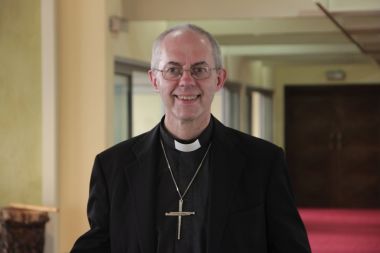Justin Welby praises journalists who 'unlock compassion' in Britain

The Archbishop of Canterbury today hit out at those who suggest that the inhabitants of the UK can live "as though the rest of the world did not matter." He criticised those who believe that "if we are sufficiently inward-looking, that the rest of the world will not affect us."
Justin Welby praised journalists who challenged the "complacency" of such people, and who "unlock the covers of the wells of compassion" that exist in Britain.
The Archbishop was speaking at the annual service at St Bride's, Fleet Street in London to commemorate journalists, cameramen and support staff killed while covering wars and other crises around the world.
He has just returned from visiting the 37th of the 37 provinces of the Anglican Communion he pledged to get round by the end of this year. The last province was that in West Africa, covering Sierra Leone and Liberia, the countries worst hit by ebola.
He said: "It is right and essential that in this darkening world we give thanks for those who witness, who light the lamp of truth where it is being snuffed out by so many, not only by savage evil, by those who sell arms and convey lies, but by those who are indifferent and forgetful.
"It is right and essential that we give thanks for those who unlock the covers of the wells of compassion that can become available in this wonderful country of ours, who challenge the complacency in which some people suggest we can live in our own country as though the rest of the world did not matter, and if we are sufficiently inward-looking, that the rest of the world will not affect us."
It was the first time an Archbishop of Canterbury has preached at the service.
Quoting Isaiah 21:6-12, he referred to the recent beheadings of American journalists James Foley and Steven Sotloff.
"We live in a world at the moment in which in many areas it feels as though the darkness is falling ever more severely on whole swathes and regions of the world, and in which the light of news very often seems to go out. Whole areas where there is fighting that is forgotten because there is simply so much of it."
The front-line reporter is the one who sees first-hand what is going on, he said.
"They are the look-outs, who stand on the watchtower, day after day and all night long, in the watches of the night."
He recalled as a child being shown a letter from an ancestor who had been in the Charge of the Light Brigade, and wrote to his mother that evening to reassure her that he was alive and unhurt and to describe the battle.
"In those days things were heard by word of mouth, by propaganda. It was the bush telegraph, famously unreliable, exceptionally partial and profoundly delayed."
He singled out a report in The Times on ebola in Freetown and around Sierra Leone for particular praise. "It bore adequate comparison, as a piece of writing, to the description of the plague by Defoe in his journal of the plague year, or Pepys," the Archbishop said, also praising a report on the BBC.
"Last Friday I sat and listened to the Chief of Staff of the UN team fighting ebola, and because of the reporting I was able to sense much more profoundly what he was saying, and to see the urgency of it."
He admitted war reporters are not always saints.
The assembled journalists, editors and photographers laughed when he added: "My experience of a few different areas of fighting and meeting war correspondents leads me to suggest, controversially, that it's just a little bit possible that they are not all entirely saintly at every minute of the day. But there is an old saying in the Church ex operandi operandum. Or to put it another way, the fact that the priest is all messed up does not mess up the sacrament."
The Rector of St Bride's Dr Alison Joyce said: "In a year that has witnessed the brutal murders of James Foley and Steven Sotloff, and in which others working in the filed have been killed, injured or taken hostage, the cost of good investigative journalism has never been more apparent. On this sad and proud day, we celebrate the courage and we mourn the tragic loss of those who have committed their lives to giving a voice to the voiceless, and to telling stories that would otherwise remain untold."











